Atlantic Canada Narratives: Staying, Coming, Returning
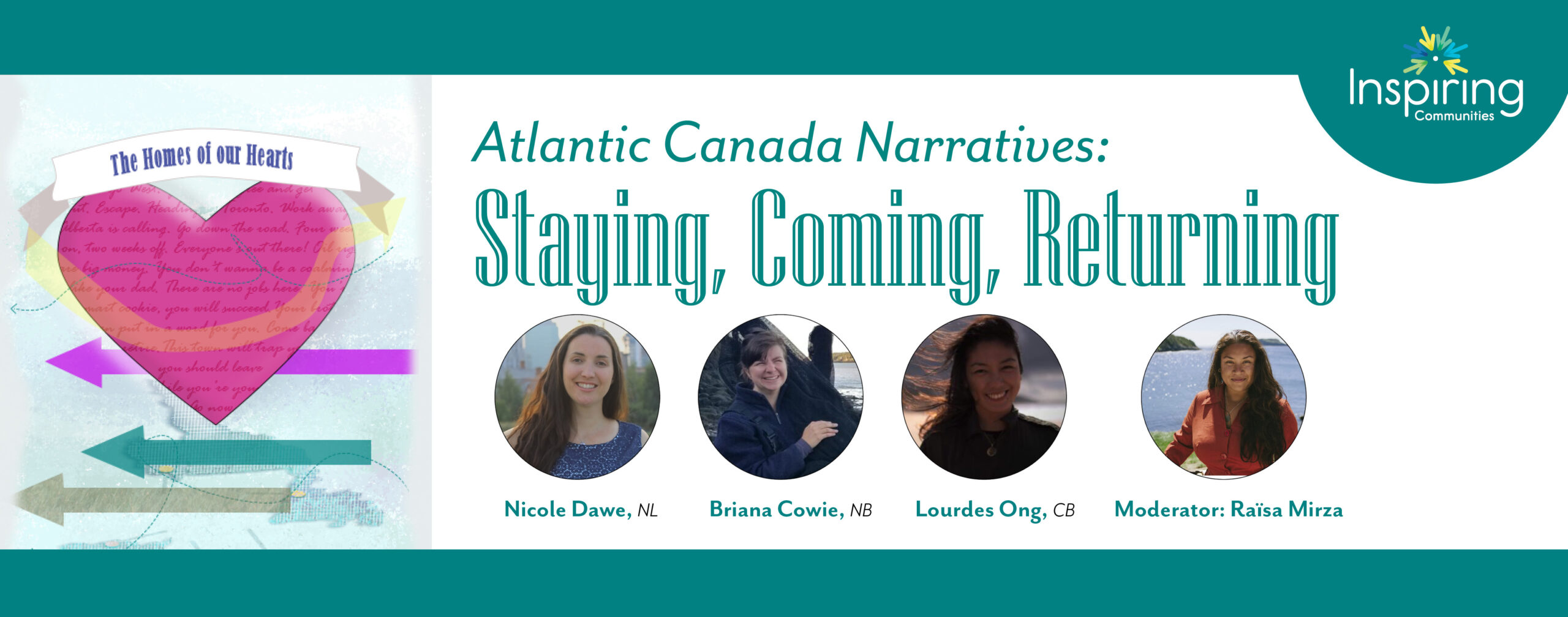
View the recording below. If you have a story about belonging or place, feel welcome to share it in the comments. Watch for more explorations about this topic.
Below we have shared the chat which will serve as a time guide for items of interest in the discussion!
| 00:19:26 | Charlene (she/her), IC: | https://www.menti.com/alnp6bywtsdz |
| 00:42:24 | Charlene (she/her), IC: | “I can’t believe you moved back” |
| 00:43:04 | Charlene (she/her), IC: | What about the last generation who may have left rural places? |
| 00:43:41 | Charlene (she/her), IC: | How does it feel to visit a “home” place that doesn’t have traces of you anymore? |
| 00:44:30 | Charlene (she/her), IC: | “Why is ‘you need to leave’ the narrative?” |
| 00:45:15 | Charlene (she/her), IC: | “How many of you would stay in your home community if you felt you had what you needed here?” |
| 00:45:35 | Raïsa Mirza: | Choices for Youth Evaluation- This sentence is one that I’d like to highlight: |
| “Through consultations with high school youth, we asked “how many of you are planning on staying in your home community?” Routinely, about 20% of the room would raise their hands. When following up with “how many of you would stay in your home community if you felt you had what you needed here?”, that number grew to approximately 80%.” | ||
| 00:47:55 | Charlene (she/her), IC: | What are the common stories from newcomers’ countries of origin? |
| 00:48:02 | Raïsa Mirza: | Balikbayan boxes – a box sent from abroad to the Philippines to show love to their families from far away |
| 00:48:16 | Charlene (she/her), IC: | What are the expectations of support / sending things home? |
| 00:48:52 | Nata Kostenko: | +1 to what people different people consider to be “not many opportunities”. I also see it with people’s perception of safety. When someone from Maritimes says “it’s not a safe place” about some area in Halifax or Miramichi, I have a very different reference point and to me it feels very safe. |
| 00:48:56 | Charlene (she/her), IC: | “We carry that curiosity, eagerness and hope to make our home here.” |
| 00:49:42 | Charlene (she/her), IC: | Different ideas of safety based on a frame of reference! I appreciate that! |
| 00:50:16 | Charlene (she/her), IC: | “Initially planned to be a conflict journalist far away.” |
| 00:50:39 | Inda Intiar (she/her): | Nahlah Ayed <3 |
| 00:50:49 | Charlene (she/her), IC: | “As I approach 30, I have a much different mindset about what NB has to offer” |
| 00:51:11 | Charlene (she/her), IC: | “High school is the best time of your life.” We are all grateful this is not so! |
| 00:51:57 | Charlene (she/her), IC: | Government and media contribute to the narrative that you must leave here to succeed. |
| 00:52:30 | Charlene (she/her), IC: | “Spent a year in NL, and it is interesting to hear other province’s perspectives.” |
| 00:52:31 | Inda Intiar (she/her): | Hahaha I heard the no funswick one too! |
| 00:52:31 | Louise Inspiring Communities: | Wondering what I’d put in my Balikbayan box 🤔🥰 |
| 00:52:34 | Charlene (she/her), IC: | No funswick! |
| 00:53:02 | Louise Inspiring Communities: | Care packages was new terminology to me when I moved to Canada |
| 00:53:22 | Nata Kostenko: | Re sources of narratives – I’m in NS, I literally heard on radio “go to Alberta to make your dreams come true” as an ad, and I got Facebook ads re – go work in Montreal, opportunities are there |
| 00:53:30 | Charlene (she/her), IC: | “I acknowledge my privilege, but the “Have not” story has come, in my experience, from government and media” |
| 00:54:59 | Inda Intiar (she/her): | Remote work has opened up so many opportunities for me, and many of my friends, to live here but make a wider impact, or access employers beyond Atlantic. |
| 00:55:00 | Charlene (she/her), IC: | https://www.fraserinstitute.org/tags/have-not-provinces |
| 00:55:33 | Charlene (she/her), IC: | Modalities of belonging: what is your experience… do you have to be here 100% of the time to belong? |
| 00:56:10 | Louise Inspiring Communities: | Cocreate narratives – different forms of value (Des sees Northside differently, can reintroduce it to residents and other Maritimers) 🤔 wonder with the Choices for Youth what “having everything we need” means 🥰 |
| 00:56:45 | Charlene (she/her), IC: | “As a newcomer, we see that some newcomers experience homesickness but for us, we feel happy to be here….I am creating space in my heart to belong.” |
| 00:57:06 | Charlene (she/her), IC: | “You need to learn about the community too.” |
| 00:57:11 | Lauri Ravanello, ACOA: | very profound, Des. |
| 00:57:39 | Charlene (she/her), IC: | We need to make space for newcomers so they can co-create these places with us. |
| 00:57:44 | Astrid Arumae – Tamarack Institute: | Being included |
| 00:58:12 | Lauri Ravanello, ACOA: | totally agree, Nicole |
| 00:58:22 | Charlene (she/her), IC: | The come-from-away / territoriality comes from the perception of scarcity – fear of losing more. How do we combat that story? |
| 00:59:01 | Charlene (she/her), IC: | Place of work can help create a sense of belonging more quickly. |
| 00:59:15 | Inda Intiar (she/her): | “The path to belonging is expedited by your privilege.” 10/10! |
| 00:59:25 | Raïsa Mirza: | Pathway to belonging is expedited by privilege. – very valid point |
| 01:00:15 | Lauri Ravanello, ACOA: | or be born here |
| 01:00:29 | Charlene (she/her), IC: | The CFA narrative no longer serves us |
| 01:00:34 | Libby Schofield (she/her): | 👏👏👏 |
| 01:01:18 | Louise Inspiring Communities: | There are also the realities of being from this place and having histories erased… contested narratives need to weave that in as well |
| 01:01:30 | Charlene (she/her), IC: | How does gender identity interplay with the feeling of belonging? |
| 01:02:06 | Charlene (she/her), IC: | There was a great discussion about that last night here regarding changes in Digby and Parrsboro |
| 01:02:49 | Raïsa Mirza: | Feel free to put your questions in the Q&A or in the chat! |
| 01:02:54 | Charlene (she/her), IC: | Once the visible presence of a queer community is established the community (many in the community) will come to appreciate what the benefits are |
| 01:02:56 | Libby Schofield (she/her): | And considering intersectionality too…race, sexuality, class, ability all contribute to those privileges which accelerate belonging |
| 01:03:27 | Carole Browne: | Charlene I agree, I’m originally from NS, but left for 30years, now back I’m definitely homesick but home sick for Ontario where I spent 30 years of my life. But in my heart even though I knew I always wanted to come back, now here I feel the pressure, and feeling change which is difficult |
| 01:04:06 | Charlene (she/her), IC: | Your own perspective plays a role as well — that is influenced by gender, intersectional identities. |
| 01:04:49 | Charlene (she/her), IC: | Who tells the story / who starts the narratives / who controls the narratives? |
| 01:05:05 | Nata Kostenko: | An observation I had – in Europe, immigrants are often called expats, very rarely immigrants, or not called anything, really. In Canada, the word immigrants is used a lot. And, after learning a bit more about Canadian history, I’m not sure why Come From Away or the concept of “immigrant” exists at all. Ok, your family has been here for 2-3 generations, but they still were immigrants at some point. Dunno… I’ve been thinking a lot about this, and I don |
| 01:05:22 | Nata Kostenko: | *don’t have a question to this, but curious to hear your thoughts. |
| 01:05:37 | Libby Schofield (she/her): | What do we ‘owe’ to our communities if we’ve returned after time away? What skills or experiences to do we bring back (especially regarding education or experiences of other cultures) and how can we share those learnings with our hometowns/communities? |
| 01:06:19 | Charlene (she/her), IC: | “The magnetic force of the Bay of Fundy” |
| 01:06:30 | Libby Schofield (she/her): | Reacted to “”The magnetic force …” with 🌊 |
| 01:06:42 | Inda Intiar (she/her): | I’m from Jakarta, so nature was not really a thing lol But once I learned that I can enjoy nature safely, I began to care more about it, and I begin to feel so tied to the North Atlantic. Every time I leave, I miss it. |
| 01:06:56 | Astrid Arumae – Tamarack Institute: | How can we ensure that we don’t fall out of our own stories? Holding onto our past while looking into the future. |
| 01:07:34 | Vicki Clough: | Replying to “An observation I had…” I have a serious aversion to the term “ex-pat”. 😆 And I prefer the shift towards “newcomer” in recent years here. Just my 2cents. 🙂 |
| 01:07:41 | Louise Inspiring Communities: | @Libby love that- this is where I consider circular economies, social value , community wealth, community vitality – thanks for asking this |
| 01:07:45 | Inda Intiar (she/her): | Nature is such a big pull here, one of the best things in think, but perhaps like me, some people needed extra guidance and encouragement to get closer to it. |
| 01:08:03 | Charlene (she/her), IC: | Does our identity change when we belong to a new place? |
| 01:08:08 | Nata Kostenko: | Replying to “An observation I had…” 😄 I’m up for exploring terms and concepts, no strong preference. |
| 01:09:12 | Libby Schofield (she/her): | And considering connections to land in the context of stolen land! |
| 01:09:43 | billieyvetterogers: | Replying to “An observation I had…” I’ve heard “ex pat” in reference to those who moved away and came back… |
| 01:09:48 | Nata Kostenko: | Replying to “Nature is such a big…” |
| in Halifax, at a local recreation center, they are running a pilot Women Outdoor Program now I’m a part of, very encouraging, guiding hikes, teaching how to make fire, and so on | ||
| 01:10:32 | Charlene (she/her), IC: | Replying to “Nature is such a big…” I keep meaning to do this program, I’ve heard great things about it! |
| 01:11:07 | Charlene (she/her), IC: | Knowing the landscape helps you belong (and enjoy) your community. |
| 01:11:52 | Nata Kostenko: | Replying to “Nature is such a big…” It’s the first time the Adventure rec center is running it for women of all ages here, and they tailor it to us – I’d definitely recommend to join a similar program anywhere |
| 01:12:03 | Charlene (she/her), IC: | How can food / foodways help us with belonging and holding onto our stories? |
| 01:12:20 | Libby Schofield (she/her): | I’ve been living away for 5 years, and I have never eaten this many donairs and lobster rolls until I left! 😅 |
| 01:12:46 | Charlene (she/her), IC: | “Food opens conversation, it’s a comfortable way to offer cross-cultural learning. “ |
| 01:13:18 | Charlene (she/her), IC: | Someone needs to mention foraging and how native / natural foods come in to it! |
| 01:13:31 | billieyvetterogers: | Replying to “How can food / foodw…” Food is a wonderful tool for learning, and sharing culture, and language |
| 01:14:24 | Nata Kostenko: | Replying to “An observation I had…” @billieyvetterogers oh that’s curious! |
| 01:14:31 | Louise Inspiring Communities: | Sociable! 😊🥰 |
| 01:15:12 | Inda Intiar (she/her): | Potluck is a concept that I love. In Indonesia, if you invite, you pay and feed everyone. I like that we potlucks allow everybody to pitch in (easier on the pocket too! LOL) |
| 01:15:32 | Charlene (she/her), IC: | Nobody does potlucks like a Maritimer. |
| 01:16:05 | Arianna: | Replying to “Nature is such a big…” The Women Outdoor Program sounds amazing! I’d be up for joining something similar in St. John’s |
| 01:16:05 | Charlene (she/her), IC: | Fiddleheads on the side! |
| 01:16:56 | billieyvetterogers: | Foods are also a powerful connector – like when there is a funeral or a wedding or a baby shower… everyone chips in to contribute food as a method of showing they care |
| 01:17:57 | Nata Kostenko: | “what’s your favorite way to have potatoes?” is the best icebreaker/small talk question I’ve encountered in the past months. |
| 01:18:19 | Louise Inspiring Communities: | Speaking of food. Aruna Dhara wrote an excellent globe and mail article about curry stained yogurt containers passed around families and in community #tupperwareforthewin 😊 |
| 01:18:27 | Arianna: | Replying to “Foods are also a pow…” And I find that it’s a way we gain a community when we move somewhere new |
| 01:19:01 | Charlene (she/her), IC: | Everyone sign up for Raïsa’s cookbook. 😀 |
| 01:19:28 | Louise Inspiring Communities: | https://www.theglobeandmail.com/amp/life/first-person/article-its-funny-how-moms-annoying-kitchen-habit-is-now-my-own/ |
| 01:20:13 | Nata Kostenko: | Replying to “Foods are also a pow…” I’ve learned a concept of MealTrains (and a website with the same name), where friends sign up for making a meal for someone who has recently experienced some change in life, and you can help them by making a dinner and dropping it off. One friend books one evening, and then one by one they form a “meal train” like a chain of meals |
| 01:21:05 | Louise Inspiring Communities: | https://theovercast.ca/5-things-you-didnt-know-about-traditional-newfoundland-cuisine/#:~:text=The%20reason%20we%20traditionally%20douse,our%20province%2C%20particularly%20for%20toutons. |
| 01:21:13 | Charlene (she/her), IC: | I feel like people who have experience away bring a rich new vision / sense of what is possible AND that is sometimes what is grating for people who live there (WHY DO WE NEED MORE TALL BUILDINGS / OUR BUS SYSTEM WON’T GET BETTER, I JUST NEED A BETTER CAR / YOU CAN’T DO THAT HERE, IT WILL NEVER WORK) |
| 01:21:55 | Arianna: | Replying to “Foods are also a pow…” Do you know where they do MealTrains? |
| 01:22:32 | Nicole Dawe: | Xavier Campbell has been bringing forward the connection between NL and the Caribbean, for anyone who is interested – https://www.cbc.ca/news/canada/newfoundland-labrador/opinion-xaiver-campbell-cod-myths-1.6284952 |
| 01:22:57 | Amy Pieroway (she/her): | I struggle with the challenges of environmental sustainability and my impact in NL (and possibly the Atlantic Provinces as a whole). As someone who lived away for a period of time, I was able to access local fruits/vegetables etc much easier in other areas. I am privileged to be able access local meats, and have the financial security to pay more for the produce I want, but often wonder about how we reconcile this for newcomers, those who want to return. |
| 01:23:29 | Charlene (she/her), IC: | The strongest communities have a good mix of people from the place who know it deeply, people from away who can be critical and people who have lived away and returned with ideas they can immediately connect to community assets. |
| 01:23:36 | Lauri Ravanello, ACOA: | it is great to share and learn from each other |
| 01:23:54 | Charlene (she/her), IC: | Island people gonna island |
| 01:25:32 | Julia Bloomquist: | This has been such a thought-provoking session! I sadly have to tuck away for an unexpected meeting but would love to be sent the recording to catch the last portion of this. Thanks for the great questions, reflections, and for the themes being captured in the chat too. Nice feature. Eager to catch the next one! |
| 01:25:44 | Lauri Ravanello, ACOA: | Sorry everyone, I have to head off to another meeting. Great conversations. Super job panelists!!! |
| 01:25:45 | Charlene (she/her), IC: | Indigenous / Black / French histories of space – intersections of history in a place |
| 01:25:49 | Raïsa Mirza: | Replying to “This has been such a…” thanks for joining! |
| 01:27:29 | Louise Inspiring Communities: | 😂😂😂 Island people gonna island |
| 01:29:51 | Raïsa Mirza: | They think the other is better than them |
| 01:29:54 | Charlene (she/her), IC: | “assumed privilege” can be the root of some problem. “Perception that the ‘other’ thinks they are better than me” |
| 01:30:07 | Hannah Main: | Want to put in a plug– at the Rural Futures Research Centre at Dal we do a lot of work around this kind of stuff. In 2018 we released a report about youth outmigration. It’s available https://rfrc.ca/presentation/seminar-youth-outmigration |
| 01:30:27 | Charlene (she/her), IC: | Thank you Yvette! |
| 01:31:13 | Charlene (she/her), IC: | Mainlanders vs Islanders – a perpetual source of conflict / challenge |
| 01:32:21 | Nata Kostenko: | I don’t think I ever asked about this – but what do people from Newfoundland think/feel about vikings who came, and then decided to leave back in the day? |
| 01:32:23 | Raïsa Mirza: | Replying to “Want to put in a plu…” Amazing Hannah! Thank you |
| 01:33:02 | Charlene (she/her), IC: | For more neat reflections on being a newcomer, check out Inda’s episode of polarizingconversations.com podcast. |
| 01:33:03 | Charlene (she/her), IC: | https://www.polarizingconversations.com/episodes/05-what-are-the-responsibilities-of-being-a-canadian |
| 01:33:06 | Kristen Murray, NLFC (she/her): | Sorry for being late, happy to be here and see some familiar names/faces! |
| 01:33:40 | Raïsa Mirza: | Replying to “Sorry for being late…” |
| 01:33:43 | Astrid Arumae – Tamarack Institute: | I will be moving to rural NL from Montreal. I’m a slightly old newcomer (in Canada 13 y). I chose to move to be closer and more connected to nature and to live in a community that is so rich in human spirit and connection. |
| 01:34:21 | Astrid Arumae – Tamarack Institute: | India – so true – focus on what is strong instead of what is wrong |
| 01:35:05 | Charlene (she/her), IC: | Replying to “Want to put in a plu…” LOVE shared resources! Thank you! |
| 01:35:58 | Charlene (she/her), IC: | Replying to “I will be moving to …” That is not a description we often hear from folks who have lived here a long time, and it is so appreciated. Thank you. |
| 01:35:59 | Kristen Murray, NLFC (she/her): | Replying to “I will be moving to …” Love that, where to? |
| 01:36:17 | Nicole Dawe: | Replying to “I will be moving to …” Welcome Astrid!! Feel free to reach out if there is anything that you need as you move through that. |
| 01:36:58 | Astrid Arumae – Tamarack Institute: | Thank you – would love to connect. |
| 01:37:01 | Charlene (she/her), IC: | “Instead of comparing to other areas with problems what if we focused on assets, what we could do better on our ow terms. “ |
| 01:37:11 | Charlene (she/her), IC: | “It’s not enough” is old thinking. |
| 01:37:20 | Louise Inspiring Communities: | What if we were enough(and no one was coming to save us)?😎🤔 |
| 01:37:26 | Inda Intiar (she/her): | Reacted to “What if we were enou…” with 💛 |
| 01:37:27 | Kristen Murray, NLFC (she/her): | Reacted to “What if we were enou…” with ❤️ |
| 01:37:34 | Nicole Dawe: | Reacted to “What if we were enou…” with ❤️ |
| 01:37:47 | Charlene (she/her), IC: | We have done this before. We have a history of innovation and resilience. Indeed, as Louise says, “What if we were enough?” |
| 01:37:54 | Inda Intiar (she/her): | Reacted to “We have done this be…” with 💛 |
| 01:37:55 | billieyvetterogers: | Reacted to “What if we were enou…” with ❤️ |
| 01:39:03 | Astrid Arumae – Tamarack Institute: | I think the scarcity mindset occurs everywhere and we will see more of it as we will see greater movement of people due to displacement bc of climate change, and conflicts across the world |
| 01:39:13 | Libby Schofield (she/her): | Reacted to “I think the scarcity…” with 💔 |
| 01:39:19 | Amy Pieroway (she/her): | Reacted to “I think the scarcity…” with ❤️ |
| 01:39:38 | Arianna: | Replying to “”Instead of comparin…” This is a very powerful assessment that in practice often falls short. We will attempt to replicate a system/program/solution implemented somewhere else without stopping to consider whether it is practically feasible to the current context |
| 01:39:47 | Louise Inspiring Communities: | When can we buy the foraging recipes book? |
| 01:39:52 | Raïsa Mirza: | What is a question you are holding? |
| 01:40:09 | Raïsa Mirza: | Replying to “When can we buy the …” Summer 2024! |
| 01:40:11 | Amy Pieroway (she/her): | Replying to “When can we buy the …” same same Raïsa! |
| 01:40:20 | Louise Inspiring Communities: | 💕🙏🏿👌🏿 |
| 01:40:35 | Astrid Arumae – Tamarack Institute: | Also – regarding foodways – I recently listened to this amazing talk by Lori McCarthy about belonging and footways. It so resonated me about what is so special about NL and the spirit of place. https://www.ted.com/talks/lori_mccarthy_how_to_find_a_sense_of_belonging_wherever_you_are |
| 01:40:43 | Charlene (she/her), IC: | How can we continue to utilize the vision and energy of newcomers / returners to help us NBAs (never been aways) see and appreciate this place with new eyes? |
| 01:40:47 | Amy Pieroway (she/her): | How do we create linkages and pathways in our communities to ensure knowledge translation for new comers and returners. |
| 01:40:47 | Arianna: | Replying to “I think the scarcity…” But this is an opportunity to empower people into action |
| 01:40:53 | Raïsa Mirza: | How do we hold more space and time? |
| 01:40:59 | Astrid Arumae – Tamarack Institute: | Replying to “I think the scarcity…” absolutely |
| 01:41:03 | Raïsa Mirza: | Reacted to “How do we create lin…” with 💕 |
| 01:41:11 | Charlene (she/her), IC: | Briana is NOT a delinquent, don’t listen to her. LOL |
| 01:41:20 | Arianna: | Replying to “How can we continue …” I love this! |
| 01:41:37 | Raïsa Mirza: | Where is my value best hosted in place? |
| 01:41:52 | Raïsa Mirza: | “Why don’t we feel we’re enough? What can we do to counter that narrative?” |
| 01:42:08 | Nicole Dawe: | Replying to “Briana is NOT a deli…” Yes. And I think that’s part of the space we can hold for each other, too, in terms of ensuring we can be honest about our capacity at any given time and that’s fine. |
| 01:42:17 | Charlene (she/her), IC: | One last time… please add your parting thoughts to the MENTI: https://www.menti.com/alnp6bywtsdz |
| 01:42:19 | Inda Intiar (she/her): | So grateful and love that we have space to discuss all of these things, out of love of place and community <3 (I get very passionate about this haha, but I’m not angry I promise!) |
| 01:42:29 | Arianna: | Replying to “How do we hold more …” We make the space for the silences voices. We don’t assume we know what other communities need. We listen to them and include them in the execution and design of programs |
| 01:42:37 | Briana Cowie | ECW: | Replying to “Briana is NOT a deli…” Well you guys are very kind! |
| 01:42:44 | Briana Cowie | ECW: | Replying to “Briana is NOT a deli…” I’m very happy I came – you’re all wonderful |
| 01:42:53 | Charlene (she/her), IC: | Only marginally related: how can you not love a space that has place names like Dagger Woods? |
| 01:42:57 | Raïsa Mirza: | “How do we reflect and unpack, in community settings and also personally, to unlearn these narratives?” |
| 01:43:43 | Briana Cowie | ECW: | Thank you everyone! |
| 01:43:45 | Vicki Clough: | Thanks everyone! |
| 01:43:54 | Amy Pieroway (she/her): | Thank you everyone. Feeling energized by this conversation |
| 01:43:58 | Des Ong, Inspiring Communities: | Reacted to “Thanks everyone!” with ❤️ |
| 01:44:00 | Libby Schofield (she/her): | Thanks everyone! Such a rich conversation! ❤️ |
| 01:44:02 | Inda Intiar (she/her): | Thank you all, such a great conversation. <3 |
| 01:44:05 | Astrid Arumae – Tamarack Institute: | Thank you for today 🙂 |
| 01:44:11 | Carole Browne: | Thank you |
| 01:44:15 | billieyvetterogers: | How can we influence government that investing in sustainability and community based social development is as valuable as investing in growth-model economic development |
| 01:44:20 | Arianna: | Thank you! I hope to be here again in the future! |
| 01:44:35 | Kristen Murray, NLFC (she/her): | Thank you! |
| 01:44:35 | Nata Kostenko: | Thank you! |
Description
There is a common story shared across our Atlantic Provinces. We have spent decades telling our children that they would have to move away to succeed. The movie “Going Down the Road” from 1970 was an early reflection on this truth, a film co-written and produced by Don Shebib, a Toronto-born filmmaker whose father was from Sydney, NS and whose mother was a Long from Newfoundland.
This story then became the perennial “brain drain” panic among news media and politicians, as in this 2013 Globe and Mail article. Who will be here to pay taxes and take care of us when we are old?
Many did flee to far-flung locales, but found the draw homeward was deeply planted, and wound through their cultural lives: like this anthem to Cape Breton, or this song from Newfoundland’s Rum Ragged, or even this classic that nods to PEI’s “red, red mud.” Many of the songs and other cultural works draw on the original Scottish, Irish and French settler’s longing for their homes across the sea.
“Kjeld Mizpah (KJ) Conyers-Steede, an Inspiring Communities Fellow, asked a really powerful question in a session he facilitated recently – “When was the first time you were told you needed to leave this place (Atlantic Canada) to have success?”
I have a clear memory of sitting in my classroom in grade 5 and telling everyone, “I’ll have a lot more opportunities there (Halifax).” This doesn’t feel like something a 10-year-old observes on their own without influence. How can we create a prosperous future for ourselves and this place within a story that tells us we need to leave?
Where does all of this grow from? A multitude of places and many that are still to be uncovered for me and for others. We live in colonial places and within a consumer story and white supremacy culture. How do we explore and deconstruct these stories that we hold within ourselves and more broadly in our communities?”Nicole Dawe, Finding Enough
So, with more Atlantic Canadians moving home and forging a new path in this place, what is the new narrative? How do these narratives speak to our new settlers, the immigrants and newcomers who have chosen to move here? What does all of that mean for those who never left? And how do these settlers connect with reconciliation and the recognition that the Mi’kmaq, Maliseet, Passamaquoddy, Beothuk, Inuit and Innu peoples lived on this land thousands of years before us?
What does it mean to be “of” a place? What is “belonging”?
Through personal story sharing and discussion, we will explore these narratives about our place in the world, and this place in our hearts.
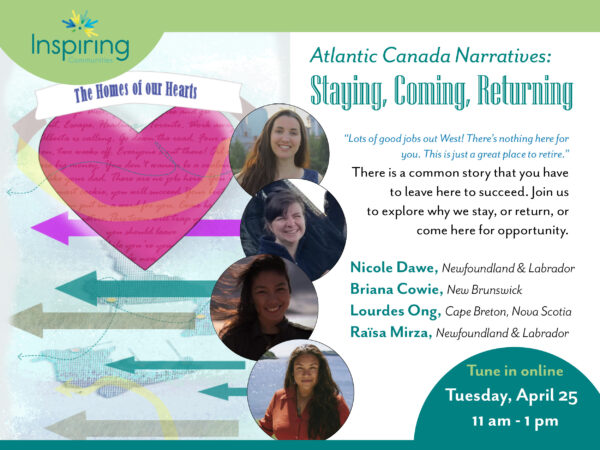
Panelists
Nicole Dawe
Nicole is a proud Newfoundlander and Labradorian who is raising her daughter and building a life with her partner in the province. Nicole was raised in a multi-generational community and has been working to create communities of care in her personal and professional life ever since. Nicole enjoys listening to what’s on people’s hearts and finding opportunities to make connections and pollinate between people, ideas and resources in the communities she works in. Nicole is fortunate to have played a role in the journeys of many charities and nonprofits, most often bringing together groups of people to support and resource ambitious community work. She is currently stewarding the Community Foundation of Newfoundland and Labrador and being curious about how to involve more people in becoming co-authors of their community and economy.
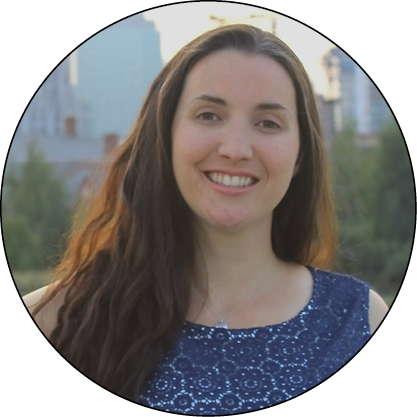
Des Ong

Originally from Manila, Philippines, Des came to Canada in 2019 and completed her post-graduate studies in Business Management in 2021. Des was also one of the participants of the Northside Changemakers Program. Now she is the Communications Coordinator for Inspiring Communities. Before coming to Canada, Des was working in advertising, public relations and was also a creative entrepreneur. Des volunteers for the Cape Breton Local Immigration Partnership specifically supporting the Immigrant Advisory Table.
Brianna Cowie
Briana has worked on research projects ranging from mapping cultural ecosystem services for the North Shore Micmac District Council, helping to find a cohesive environmental governance system for the Gulf of St. Lawrence region as well as contributing to frameworks for full-spectrum sustainability in the Arctic region. Her proudest project to date is the Southwest New Brunswick Climate Hub – a tool for practitioners and service providers in our region.
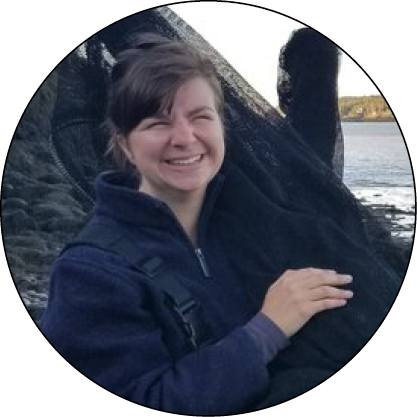
Recognizing the interconnectedness between environmental management and a collective sense of community, she has also volunteered as a member of the Charlotte County Multicultural Association, Vibrant Communities Charlotte County, the Sackville Refugee Response Coalition, and the Mount Allison Indigenous Support Group. She is currently the Vice Chair of the New Brunswick Watershed Caucus and has presented on multiple panels with the National Climate Caucus, the GovMakers Conference and most recently spoke on Parliament Hill about climate impacts to the fisheries industry. She has also worked to co-publish the NRCAN Atlantic Canada Adaptation Assessment chapter for Climate Change with 50+ other national researchers.
With a background in political science, international relations and environmental policy, she has worked for ECW since 2018, first as the Climate Change Program Manager, and now as the Executive Director. Here she works with a brilliant team to help design a more sustainable, resilient southwest New Brunswick. She now lives in St. Stephen, New Brunswick with her fiance Xander and 2 cats.
MODERATOR: Raïsa Mirza
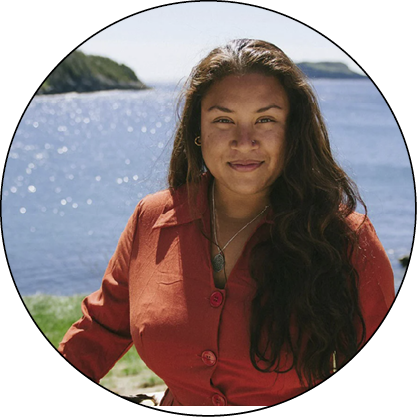
Raïsa is a human-centered designer, researcher, facilitator and socially engaged artist with experience implementing and co-creating participatory systems strengthening programs in over 20 countries in a variety of sectors and roles supporting the Su
Share this:
Comments are closed